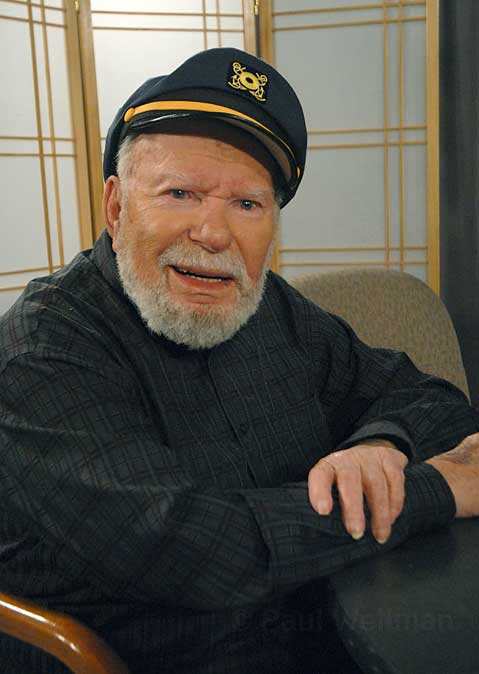Affectionately known to his family, many friends, and community members in Santa Barbara and in Winnipeg, Canada, as “Happy Captain,” George Werier departed from these Santa Barbara shores just shy of his 93rd birthday.
George, born in Winnipeg, thoroughly enjoyed a diverse and adventurous life in the spotlight. However, there was no better place to him than where he was in the moment. And although he played various roles as a stage and screen actor, he was a highly original character himself. From the northern reaches of Canada, where he taught theater on Eskimo reservations, to Santa Barbara, where he received accolades in 2008 as the oldest living television producer of cable programming in the United States, George made a big impact on a number of communities.

When he took his first step onto the stage in Canada at the tender age of three, the acting bug bit George hard, and he never looked back. Ironically, in real life, George was the opposite of the dark, troubled characters he usually played, such as Willy Loman in Death of a Salesman. He never met a person he didn’t want to talk with and get to know, and was constantly holding court. George’s ability to draw out people’s personalities was a natural gift that prompted him to produce and direct theater.
The Captain served in the Royal Canadian Air Force during WWII, becoming a decorated veteran. The war left him anxious to get on with his passion for living a full life, especially after coming close to death when a piece of shrapnel lodged in his leg during a battle in Britain, and he was left bleeding until rescue units arrived.
After the war, he met and married his first wife, Janet, and became an American citizen, taking up residence in West Los Angeles. There he raised three daughters, taught theater in public high schools, and produced, directed, and acted in professional theater, radio, television, and films. He performed in 57 major TV shows including 77 Sunset Strip, The Untouchables, Surfside 6, The Red Skelton Show, and the Playhouse 90 series in the 1950s and 60s. He became the resident director of the Westside Center Theater.
When he moved to Santa Barbara in 1975, George became the theater coordinator for the Department of Parks & Recreation.
He also created the Alive After 65 radio program on KTMS 1250 AM. Twice a week for the last 15 years, George produced and hosted a Channel 17 Public Access Television program formatted after the radio show. The Captain was honored by President Clinton and S.B. mayors Harriet Miller and Marty Blum for his advocacy work and his diligence in bringing information and support to seniors throughout Santa Barbara County.
George was continually recruiting guests for his program. One favorite show featured a Braille Institute classmate whose vision was restored after surgery only to discover, to her surprise, that her young son had tattooed his entire body but failed to tell her. He produced a total of 675 segments on topics ranging from health to arts to community events and world peace, frequently praising the cable station crew who faithfully volunteered their time and talents.
Ever the ladies’ man, George made the acquaintance of several women almost 10 years his senior at the Braille Institute’s ceramics classes. “They chase after me until I catch up to them,” he said. To the delight of many children, George played Santa Claus at various venues during the holidays. Proud of his 30-plus years of sobriety, George spoke at Alcoholics Anonymous conventions and on behalf of the county’s Advisory Board for Alcohol and Drug Problems regionally and nationally. He organized plays for the Goleta Triangle Club. He helped many people struggling with drug and alcohol addictions find their way back to productive lives.
Despite the macular degenerative disease that left him legally blind, George served as a mentor to many who arrived at his doorstep seeking his insightful wisdom and counsel. Although we deeply miss our beloved Captain, and the sparkle in his clear blue eyes, we will always remember him as a one-of-a-kind devoted father, grandfather, brother, and friend. We can still hear his resonant baritone speaking voice, and his three daughters tell us we must obey his order that we keep on smiling no matter what happens. He never complained of anything except his “incompoopis of the left eyebrow.” George loved humor and laughter and made all his life a stage-and all the people he met were his players.
The third eldest brother of a family of six children, George is survived by daughters Michelle Werier of Los Angeles, Cheryl Holling of Walnut Creek, and Roseanne Hoffman of San Diego; his granddaughter Cara; his sister Ruth Golden of Los Angeles, and brother Val Werier of Winnipeg, Canada.
He has taken his final bow, but leaves a legacy to cherish not only by his loving family, but by everybody whose lives he touched.
